Student Union
- By VOA News
5 tips to help international students settle into US life
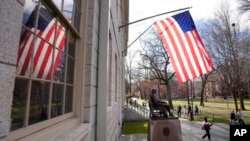
An article in Community College Daily looks at ways to support international students in and out of the classroom.
- By VOA News
Communications, value key in attracting international students, research finds
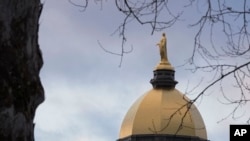
ICEF Monitor, which bills itself as "a dedicated market intelligence resource for the international education industry," takes a look at what matters to international students looking to study abroad.
- By VOA News
Diversity, alumni and funding help make US attractive to international students, school says
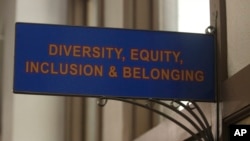
A blog post from St. John's University in New York breaks down six reasons international students love studying in the U.S.
They include:
- Gaining access to a global alumni network;
- Unlocking a wider net of scholarships and
- Unmatched cultural diversity.
Millions have had student loans canceled under Biden, despite collapse of his forgiveness plan
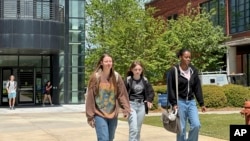
Despite failing to deliver his promise for broad student loan forgiveness, President Joe Biden has now overseen the cancellation of student loans for more than 5 million Americans — more than any other president in U.S. history.
In a last-minute action on Monday, the Education Department canceled loans for 150,000 borrowers through programs that existed before Biden took office. His administration expanded those programs and used them to their fullest extent, pressing on with cancellation even after the Supreme Court rejected Biden's plan for a new forgiveness policy.
“My Administration has taken historic action to reduce the burden of student debt, hold bad actors accountable, and fight on behalf of students across the country,” Biden said in a written statement.
In total, the administration says it has waived $183.6 billion in student loans.
The wave of cancellations could dry up when President-elect Donald Trump takes office. Trump hasn't detailed his student loan policies but previously called cancellation “vile” and illegal. Republicans have fought relentlessly against Biden's plans, saying cancellation is ultimately shouldered by taxpayers who never attended college or already repaid their loans.
Biden loosened rules for debt forgiveness
The latest round of relief mostly comes through a program known as borrower defense, which allows students to get their loans canceled if they're cheated or misled by their colleges. It was created in 1994 but rarely used until a wave of high-profile for-profit college scandals during the Obama administration.
A smaller share of the relief came through a program for borrowers with disabilities and through Public Service Loan Forgiveness, which was created in 2007 and offers to erase all remaining debt for borrowers in a government or nonprofit job who make 10 years of monthly payments.
Most of Monday's borrower defense cancellations were for students who attended several defunct colleges owned by Center for Excellence in Higher Education, including CollegeAmerica, Stevens-Henager College, and Independence University. They are based on past findings that the schools lied to prospective students about their employment prospects and the terms of private loans.
Before Biden took office, those programs were criticized by advocates who said complex rules made it difficult for borrowers to get relief. The Biden administration loosened some of the rules using its regulatory power, a maneuver that expanded eligibility without going through Congress.
As an example, just 7,000 borrowers had gotten their loans canceled through Public Service Loan Forgiveness before the Biden administration took office. Widespread confusion about eligibility, along with errors by loan servicers, resulted in a 99% rejection rate for applicants.
Huge numbers of borrowers made years of payments only to find out they were in an ineligible repayment plan. Some were improperly put into forbearance — a pause on payments — by their loan servicers. Those periods didn't end up counting toward the 10 years of payments needed for cancellation.
The Biden administration temporarily relaxed the eligibility rules during the pandemic and then made it more permanent in 2023. As a result, more than 1 million public servants have now had their balances zeroed out through the program.
All those rule changes were meant to be a companion to Biden's marquee policy for student debt, which proposed up to $20,000 in relief for more than 40 million Americans.
But after the Supreme Court blocked the move, the Biden administration shifted its focus to maximizing relief through existing mechanisms.
Republicans have called for a different approach
Announcements of new cancellation became routine, even as conservatives in Congress accused Biden of overstepping his power. Republican states fought off Biden's later attempts at mass forgiveness, but the smaller batches of relief continued without any major legal challenge.
As Republicans take hold of both chambers of Congress and the White House, Biden's changes could be targeted for a rollback. But it's unclear how far the next administration will go to tighten the cancellation spigot.
Trump proposed eliminating PSLF during his first term in office, but Congress rejected the idea. Project 2025, a blueprint created by the Heritage Foundation for a second Trump term, proposes ending PSLF, and narrowing borrower defense and making repayment plans less generous than existing ones.
- By VOA News
Startup aims to help international students with US life
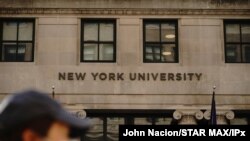
Think of it as one-stop shopping for all things American, aimed at international students.
According to an article in Washington Square News, New York University's student newspaper, roam, a student-funded startup, helps individuals navigate pricing plans for every necessity one could think of, including SIM cards, bank accounts, health insurance, scholarships, student visas, work visas and even meal prep. The all-in-one platform makes information about these necessities accessible and digestible."
College tuition has fallen significantly at many US schools, research finds
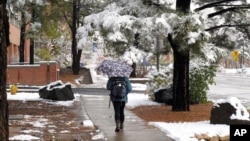
The cost of college keeps spiraling ever higher, right?
Not necessarily. New research indicates students are paying significantly less to attend public universities than they were a decade ago. And tuition increases at private colleges have finally slowed after years of hefty rises.
Figures compiled by the nonprofit College Board indicate the average student attending an in-state public university this year faces a tuition bill of $11,610, which is down 4% from a decade earlier when taking inflation into account. But the real savings come in what the average student actually pays after getting grants and financial aid. That's down 40% over the decade, from $4,140 to $2,480 annually, according to the data.
That reduced cost means less borrowing. Just under half of students attending in-state public universities are graduating with some debt, down from 59% a decade earlier, according to the College Board figures. And among those who do borrow, the average loan balance has fallen by 17%, to $27,100.
Meanwhile, at private colleges, tuition continues to rise, but at a much slower rate. It has increased 4% over the past decade, when taking inflation into account, to an average $43,350, according to the College Board. That's a big change from the two decades prior, when tuition increased 68%.
Costs are coming down as Americans question whether college is worth the price. Surveys find that Americans are increasingly skeptical about the value of a degree, and the percentage of high school graduates heading to college has fallen to levels not seen in decades, according to data from the U.S. Bureau of Labor Statistics.
Yet research still finds that, over time, a degree pays off. Americans with a bachelor's degree earn a median of $2.8 million during their careers, 75% more than if they had only a high school diploma, according to research from Georgetown University's Center on Education and the Workforce.
COVID effect
The COVID-19 pandemic has been a big factor in the cost reductions, said Jennifer Ma, an executive research scientist at the College Board and lead author of the study.
"We know that during COVID, a lot of institutions — public and private — froze tuition," Ma said.
As states and the federal government responded to the pandemic, Ma said, they increased higher education funding, allowing colleges to reduce the cost of attendance. Some of that money has since expired, however, including an infusion of federal pandemic aid that was mostly used up by the end of 2022.
Cost was a major consideration in Kai Mattinson's decision to attend Northern Arizona University. It would have cost her about $39,000 annually to attend the public university but discounts and scholarships bring that down to between $15,000 and $20,000 for the 22-year-old senior from Nevada.
"I originally wanted to go to the University of Arizona, but when it came down to tuition and other cost, Northern Arizona University was the best option," said Mattinson, a physical education major who also works as a long-term substitute at a local elementary school.
Many institutions have tried to limit cost increases. Purdue University in Indiana, for example, has frozen its annual in-state tuition at $9,992 for the past 13 years.
Mark Becker, the president of the Association of Public and Land-grant Universities, said he was pleased to see the new data.
"Institutional efforts to control costs, combined with many states' efforts to increase investments in public universities and federal investment in the Pell Grant, have increased college affordability and enabled significant progress on tackling student debt," Becker said in a statement.
Costs for those attending public two-year community colleges have fallen even more, by 9% over the past decade, according to the College Board data, which is broadly in line with federal figures collected by the National Center for Education Statistics.
Still, for parents paying for their children to attend out-of-state public universities or private colleges, the costs remain daunting — as much as $95,000 annually, in some cases. However, many institutions offer significant discounts to the sticker price for middle- and lower-income students.
Some private colleges have been expanding their financial aid, including the Massachusetts Institute of Technology, which in November announced undergraduates with a family income below $200,000 would no longer need to pay any tuition at all starting in the fall.
Other private colleges are discounting tuition as a marketing move in an increasingly difficult environment. They face a dwindling pool of young adults, and students who are more wary of signing up for giant loans. Recruiting students is crucial for staying afloat as operational costs rise. After temporary relief thanks to federal money during the pandemic, many colleges have cut programs to try to keep costs under control.
As regional schools struggle to survive, AI could provide hope

Declining enrollments are causing problems for some smaller, regional colleges struggling to survive.
But schools that embrace artificial intelligence and customer experience could be at an advantage, Eric Skipper writes in Times Higher Education. (December 2024)
Universities move away from DEI initiatives

Diversity, equity and inclusion initiatives have fallen out of favor in higher education recruiting and hiring in recent years, but even more colleges and universities are moving away from the programs now, Thea Felicity reports in University Herald.
In addition to political opposition to the programs, there are concerns that DEI initiatives hinder free speech, affect ideological balances and discourage academic freedom. (December 2024)
‘College Deserts’ leave many communities without higher education options
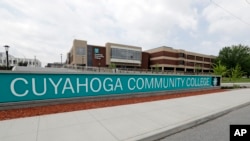
“College Deserts” – areas where high schools are located more than 30 miles away from the nearest community college – leave large groups of people unable to pursue higher education because of transportation problems, Lexi Lonas Cochran writes in The Hill.
Most college deserts are in the Southern U.S., with a recent study in Texas showing that long commuting distances discourage many potential students from attending college. (December 2024)
Analysts say rate of college closures likely to increase

If current trends continue, the rate of college closures is expected to increase, according to a new study reported in Forbes.
Closures are more likely to affect private institutions, and while the number of closures might seem small on a national level, it could cause serious problems for the smaller and mid-sized communities where those colleges are located. (December 2024)
Judge upholds racial considerations in US Naval Academy admissions

Although the U.S. Supreme Court last year decided that civilian colleges and universities could not consider race or ethnicity in admissions, a judge ruled that the U.S. Naval Academy had established a national security interest in a diverse officer corps.
That means the academy – and other military service academies – can continue to consider race. A similar policy at the U.S. Military Academy at West Point has also been challenged, but that case has not yet gone to trial, according to a report in Navy Times. (December 2024)
Harvard recommends gap year as a strategic move
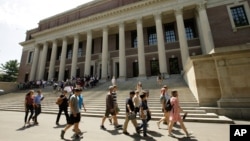
While some students and parents see the gap year as a waste of time, others see the break in academic studies as valuable for developing maturity, earning money or focusing goals.
MSN.com explains some of the reasons why Harvard – and other prestigious schools in the United States – are recommending that students take a gap year. (December 2024)
Student dilemma: Financial aid applications can expose undocumented parents
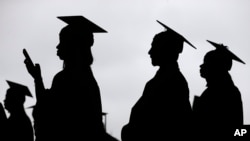
Many students in the U.S. rely on financial aid to attend colleges and universities, but as Julia Barajas reports in LAist.com, the Free Application for Federal Student Aid could cause a dilemma for students with an undocumented parent.
If students fill out the application, they will share their parents’ financial information – and potentially raise questions about their immigration status -- with the federal government. If they don’t fill out the application, they won’t get federal financial aid. (December 2024)
FDA: College students using ‘honey packets’ to enhance sex put themselves at risk
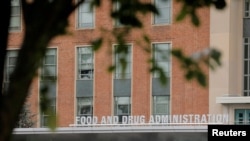
With TikTok videos promoting “honey packets,” the supplements marketed as sexual enhancements have become popular on college campuses.
But as Charles Trepany reports in USA Today, the Food and Drug Administration has warned that ingredients in the supplements could be potentially dangerous. (November 2024)
Some universities encourage Chinese students to return before inauguration

Some colleges and universities are encouraging international students to return to the United States – or stay in the country over winter break – to make sure any White House travel restrictions don’t impede their return, the South China Morning Post reports.
Chinese students in the United States have expressed concerns about being allowed back in the country after U.S. President-elect Donald Trump takes office on January 20. Trump has promised sweeping immigration reforms and mass deportations. (December 2024)



